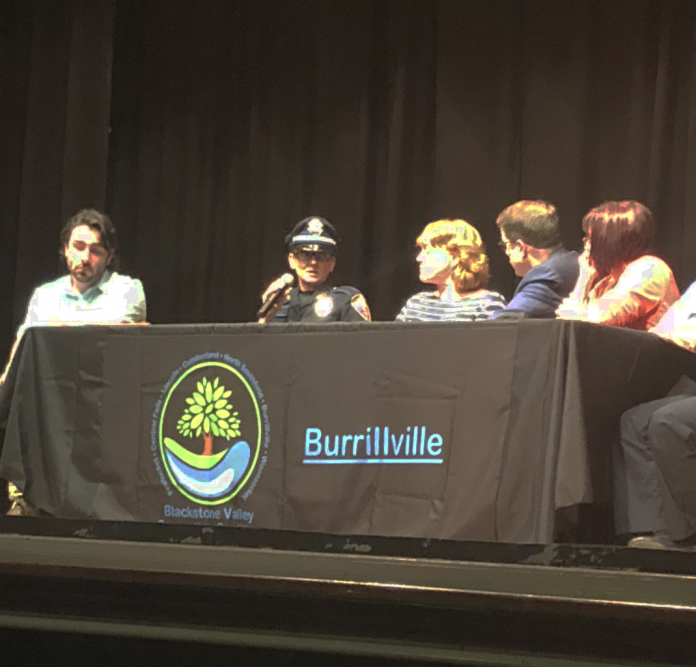
BURRILLVILLE – Before a crowd of local law enforcement officials, state authorities, first responders and others, gathered to discuss the issue of opioid use in Burrillville, Mitch Weintraub bravely admitted that he’s been on and off antidepressants since the age of six.
Weintraub, a 2010 graduate from Burrillville High School, lost a cousin to drug use at the age of 7. In that case, the drug was ecstasy, and a few years later, at the age of ten, it would be heroin that killed Weintraub’s 40-year-old uncle.
With both relatives, he said, there were signs of mental illness.
“A few years later i learned that several of my family members make regular trips to the methadone clinic,” he said.
Weintraub’s 23-year-old brother Jack was killed last August by a deadly dose of fentanyl, a tragedy that led the Burrillville native to speak out about addiction.
“The town is facing a glaring issue,” Weintraub told an audience gathered at a forum to discuss opioid use at the Assembly Theater last week, noting that the town has had 12 opioid deaths.
“Last year Burrillville, RI was the OD capital of the U.S.”
Weintraub told the audience that he himself tried his first cigarette at the age of 11. At 13, he said he tried marijuana for the first time, and by 16, he was smoking a pack of cigarettes a day.
Mitch was 2 and a half years older than his brother Jack and said that they had similar views on everything from humor to politics.
“We talked about everything. I wasn’t always the greatest role model,” said Weintraub. “I’m no less flawed than he was and I had no right to judge him for his addiction.”
Jack, he said, struggled because of his drug use, ultimately dropping out of college. He was killed by a dose of fentanyl that he thought was an oxycontin.
“He was in so much pain,” said Weintraub. “His drug use was only a symptom of the illness that he faced.”
“The one silver lining about an epidemic is that it’s too big to ignore,” Wentraub said.
At least in Burrillville, it seems, officials agree. The town hired two new people to focus on prevention and recovery for residents in January, and the pair worked together to organize last week’s panel discussion. In attendance were Rebeckah Boss, director of the Rhode Island Department of Behavioral Healthcare, Developmental Disabilities and Hospitals; Tom Coderre, senior advisor to the governor; Officer Holly Barrett from the Burrillville Police Department; Amanda Gingell, a safety officer from the Burrillville Fire Departments; and Michelle Harter of the Burrillville Addiction Assistance Program.
Discussion focused, in part, on what can be done to address that epidemic.
“This is not an urban problem. You all know that really well,” Boss said. “We have to come together in order to solve this.”
Coderre was elected to the state legislature at the age of 25, and says he was a heavy drinker before he started to use cocaine.
“I went through a pretty horrific battle with addiction,” he said.
By 2001, cocaine had cost him a leadership position in the Senate, and he was arrested twice in 2003, and ordered to jail. He says it was then that his recovery began.
“That was the moment of clarity,” Coderre said, discussing how his time in a treatment center and a long term recovery house ultimately saved his life. “This is a journey that you cannot go alone.”
Boss and Coderre talked about how Rhode Island is working to provide increased access to treatment and recovery services. The state, Boss noted, has several nationally recognized initiatives such as a program that uses “recovery coaches.”
“We’re getting a lot of additional funding from our federal partners,” Coderre said. “We recognize this is a huge problem.”
Harter was hired by the town of Burrillville in an initiative that began after the town had six opioid deaths in 2015, and is now working with 19 clients.
“There is a lot of addiction in this town,” she said.
Barrett described what it’s like to be called to the scene of an overdose, noting “it’s usually pretty chaotic.”
“i think about the family members,” said Gingell.
The group talked about the link between addiction and mental health, and the need for more honest and open discussion of an issue that people too often try to ignore.
Asked how someone could have reached him or his brother before a crisis, Weintraub said, “For me, I want you to be passionate. I want you to be real. I want you to swear at me.”
Boss noted that in the state of Rhode Island, “We are looking at bringing psychiatry into the addiction realm.”
“We want to go to every single community in the state and make sure we’re talking about this,” said Coderre. “It’s too often swept under the rug. When you don’t talk about these things, they fester.”






